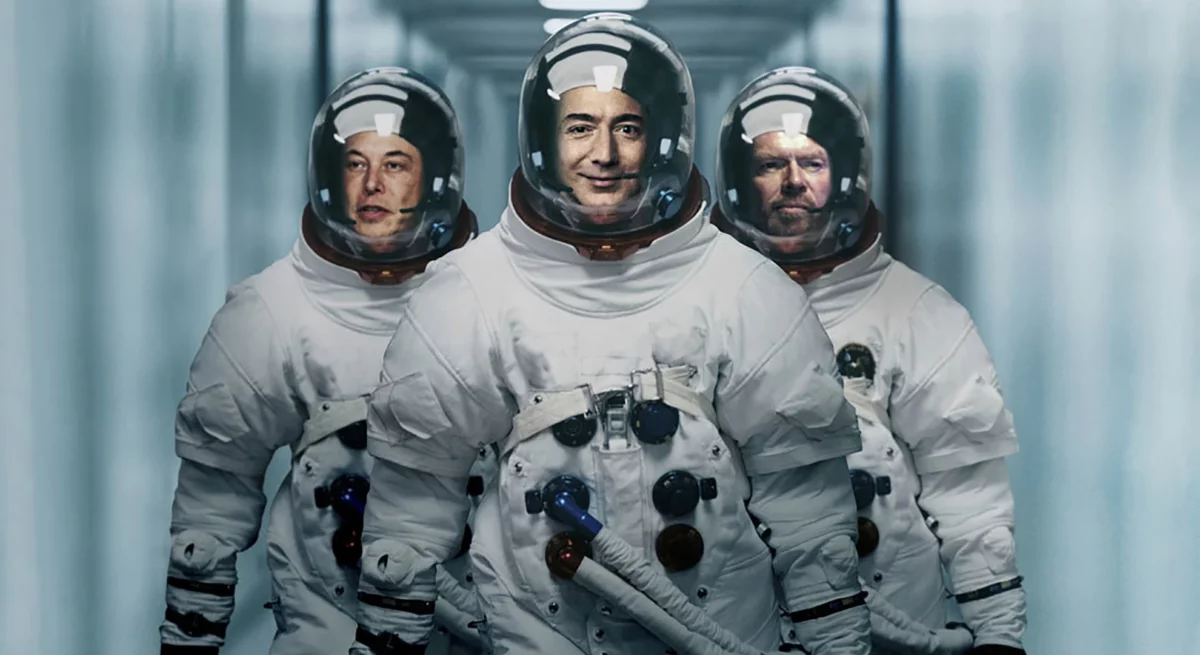The race for space has always involved power and ideology. The most notable battle took place during the Cold War. At that time, the space race was led by the Soviet Union, on the one hand, and the United States, on the other. Capitalism won on July 22, 1969, with the Apollo 11 landing on the Moon.
But now everything has changed, and the race is being led by three billionaires: Elon Musk with SpaceX, Jeff Bezos with Blue Origin, and Richard Branson with Virgin Galactic. Some people believe that this attempt at conquering space, of which we know very little, is nothing but a vanity struggle between these three billionaires. And maybe they’re right.
Either way, each of these companies is different from the others and, although they have certain aspects in common, their goals differ. Let’s see what’s up with each of them.
Blue Origin
Jeff Bezos’s company never made the headlines as much as SpaceX… Until the founder of Amazon got into a rocket ship and made a short trip to space. At that moment, the world realized that, although Musk’s company is still leading the race, Blue Origin is now close on its heels.
Both its mascot and its slogan have a significant meaning. The company’s mascot is a tortoise, and its slogan is “gradatim ferociter,” that is, “step by step, ferociously.” This is in reference to the famous fable The Tortoise and The Hare. Slowly, but steady, the tardy tortoise achieves anything it sets its mind to.
So, what does Bezos seek to achieve? In the short term, space travel. In the medium term, actual space bases. Jeff himself said that they would be like “a network of space residential developments” that would eventually become colonies for us to inhabit when we move to another planet after we finish exhausting this planet’s resources. I like to think of a more Hollywood-worthy scenario.
But while the tortoise used to take slow but fierce steps, it now seems to be running. In recent times, the company has shown how it intends to win this race, and it has escalated the rivalry with Musk. It all began with the founder’s trip to space. And then came the lawsuits against SpaceX.
Virgin Galactic
Richard Branson’s company was founded in 2009 and, although it’s currently third in the race, it made headlines around the world after its founder became the first billionaire to have traveled into space on July 11. Branson beat Bezos by a couple of days.
For now, that’s pretty much all it has done compared to its competitors. There’s no doubt it’s coming last in the race, but Branson is known for having prevailed over much bigger competitors. We’ll have to wait and see if he’ll be able to beat these two, who are no amateurs.
SpaceX
I saved the best for last. Elon Musk is equally loved and hated. Some say that he’s all bark and no bite, while others believe he has not only revolutionized the world of autonomous vehicles with Tesla, but he has also shaken things up with SpaceX and will continue to do so.
And he has plenty to brag about. One of his biggest achievements was the creation of reusable rockets that can land on their own. This has allowed the space industry to save an absolute fortune.
Musk has a clear goal: colonizing the Red Planet. “I want to die on Mars,” he said at one point. In fact, he announced he’ll launch an all-civilian crewed mission to space that will orbit around Earth for four days. When? By the end of the year. This is completely different from what his competitors have been doing, as they spent only a couple of minutes in space.
And that’s not all there is to it. SpaceX, which was founded in 2002, is the company that cooperates the most with NASA and the Pentagon, and it has already signed several contracts providing rockets for launch services to both US agencies.
Finally, before moving on to the next topic, it’s worth mentioning that many critics have recently said that, although this space race is exciting and thrilling, these companies should rather focus on solving Earth’s current issues, such as climate change. In the end, those issues will become the reason why we might have to move to another planet to survive in the first place. Just some food for thought…

